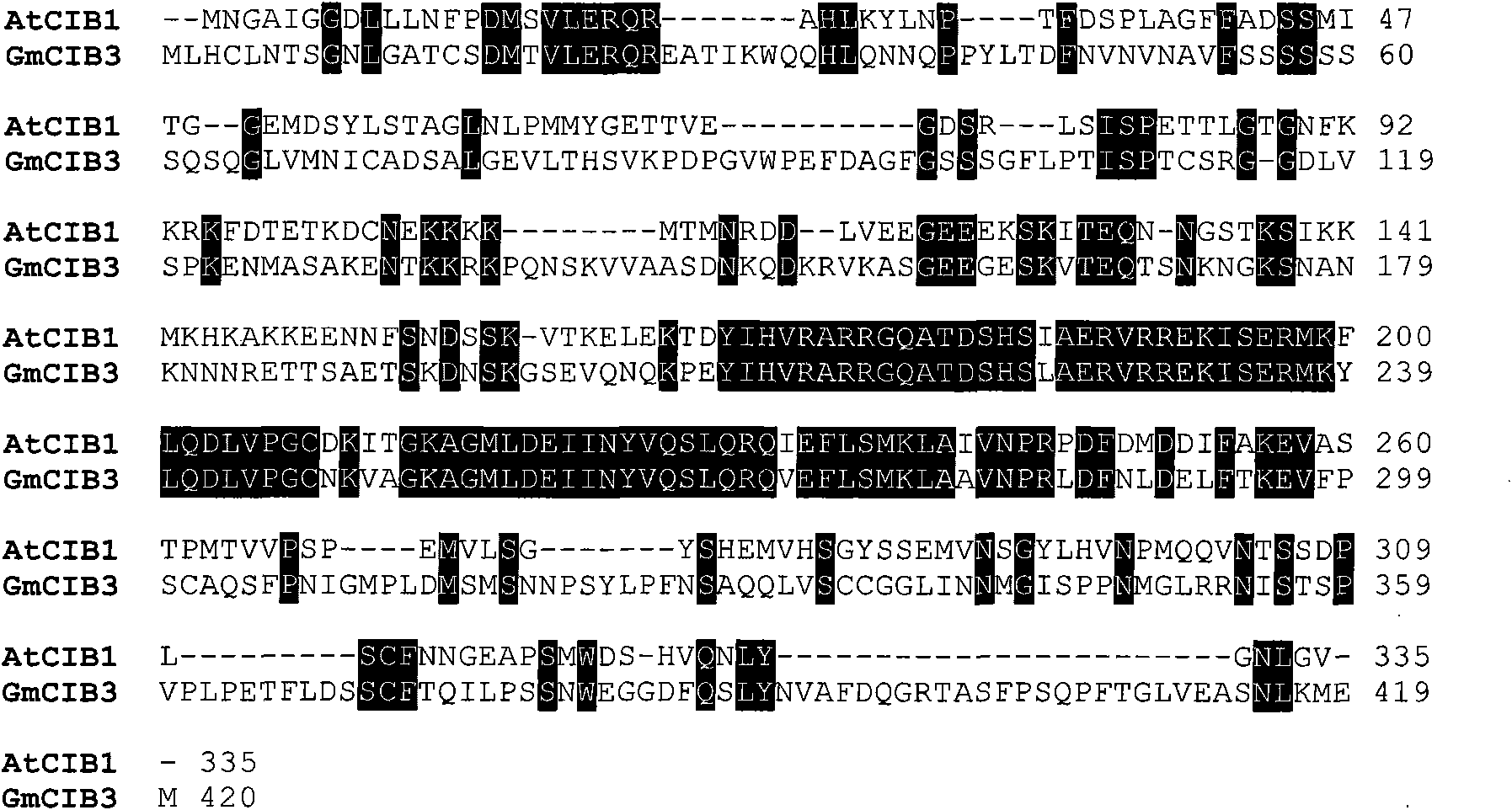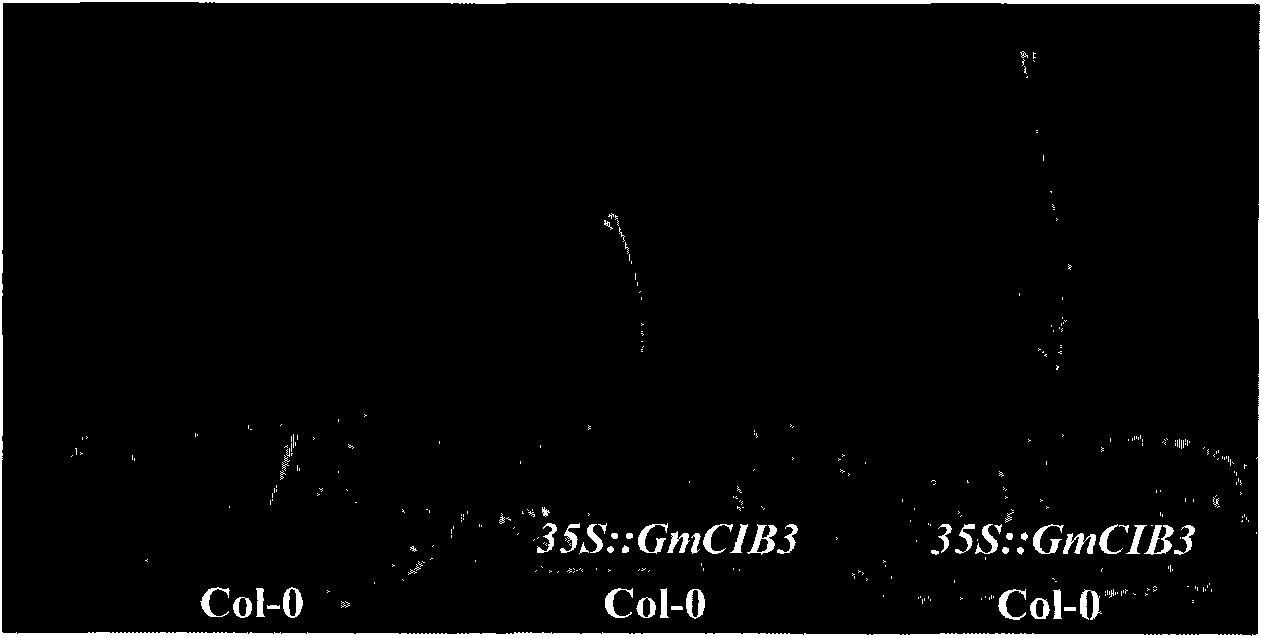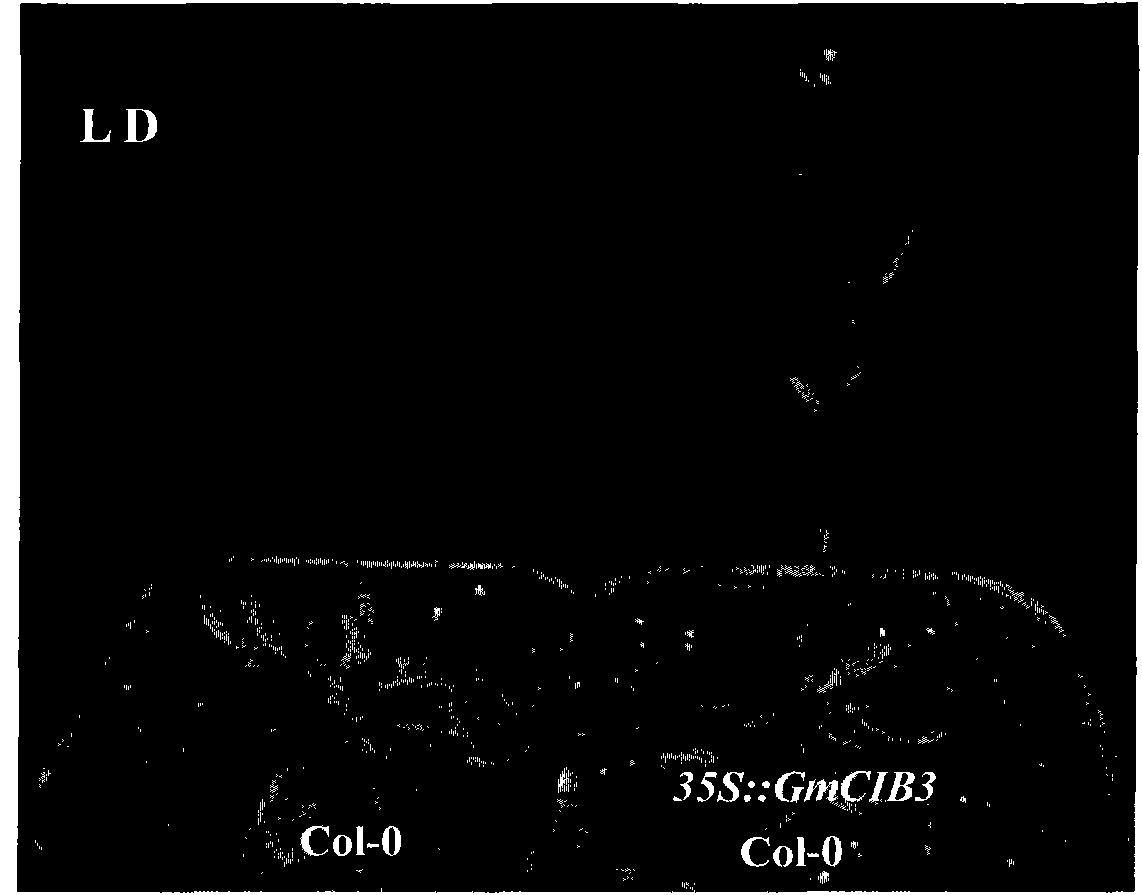Soybean blossoming regulation gene GmCIB3, coding protein and application thereof
A technology for regulating genes and soybeans, applied in the field of genetic engineering, can solve the difficult flowering habits of soybeans, without fundamentally changing soybeans, etc.
- Summary
- Abstract
- Description
- Claims
- Application Information
AI Technical Summary
Problems solved by technology
Method used
Image
Examples
Embodiment 1
[0023] Example 1 Isolation and Cloning of GmCIB3 Gene
[0024] According to the CDS (code sequence) sequence of the Arabidopsis CIB1 gene, a homology comparison was performed on the http: / / www.phytozome.net website, and a batch of soybean homologous sequences were found, among which the CDS sequence of GmCIB3 was on the soybean genome The position is Glyma06g01430.1, PCR amplification primers were designed, forward primer F1: 5′-ATGTTGCATTGTCTCAACACTTC-3′; reverse primer R1: 5′-TTACATCTCCATCTTTAGATTGCTA-3′. Using the total soybean cDNA as a template, PCR was performed to obtain the complete sequence of GmCIB3, the nucleotide sequence of which is shown in SEQ ID NO.1.
[0025] The total PCR reaction system is 25 μL, including soybean cDNA (50ng) 1 μL; dNTP (2.5mM) 2.5 μL; primer F1 (10 μM) 1 μL; primer R1 (10 μM) 1 μL; LA Taq enzyme (5U / μL) 0.3 μL; Buffer 2.5 μL; ddH 2 O 16.7 μL, a total of 25 μL. The PCR reaction program was: 94°C pre-denaturation for 5 minutes, 30 cycles a...
Embodiment 2
[0026] Example 2 Analysis and identification of GmCIB3 gene
[0027] The full-length CDS sequence of GmCIB3 is 1263bp, encoding a protein of 420AA, and its homology with Arabidopsis CIB1 protein is 44.3%. Protein structure analysis shows that its C-terminus contains a basic helix-loop-helix structure, which is a conserved domain of bHLH family transcriptional regulators, which regulates gene transcription by binding to the E-box in DNA; protein N The end also contains an NLS, which is associated with nuclear import.
[0028] According to the sequence query results on NCBI (www.ncbi.nlm.nih.gov), so far, there is no sequence information similar to CIB1 in soybean; and there are no published papers related to its function research. Therefore, GmCIB3 is considered to be a new gene in soybean.
Embodiment 3
[0029] Example 3 The acquisition of transgenic Arabidopsis thaliana
[0030] According to the sequence information of GmCIB3, PCR amplification primers were designed at both ends of its CDS, forward primer F1: 5′-ATGTTGCATTGTCTCAACACTTC-3′; reverse primer R1: 5′-TTACATCTCCATCTTTAGATTGCTA-3′. The complete sequence of GmCIB3 was obtained by PCR using the total soybean cDNA as a template.
[0031] The total PCR reaction system is 25 μL, including soybean cDNA (50ng) 1 μL; dNTP (2.5mM) 2.5 μL; primer F1 (10 μM) 1 μL; primer R1 (10 μM) 1 μL; LA Taq enzyme (5U / μL) 0.3 μL; Buffer 2.5 μL; ddH 2 O 16.7 μL, a total of 25 μL. The PCR reaction program was: 95°C pre-denaturation for 5 minutes, 30 cycles at 94°C for 30s, 53°C for 30s, 72°C for 2 minutes, and finally 72°C for 10 minutes. The above PCR procedure was repeated three times, and the three PCR products were combined for agarose gel electrophoresis, and then the purified PCR product was recovered by cutting the gel.
[0032] Th...
PUM
 Login to View More
Login to View More Abstract
Description
Claims
Application Information
 Login to View More
Login to View More - R&D
- Intellectual Property
- Life Sciences
- Materials
- Tech Scout
- Unparalleled Data Quality
- Higher Quality Content
- 60% Fewer Hallucinations
Browse by: Latest US Patents, China's latest patents, Technical Efficacy Thesaurus, Application Domain, Technology Topic, Popular Technical Reports.
© 2025 PatSnap. All rights reserved.Legal|Privacy policy|Modern Slavery Act Transparency Statement|Sitemap|About US| Contact US: help@patsnap.com



